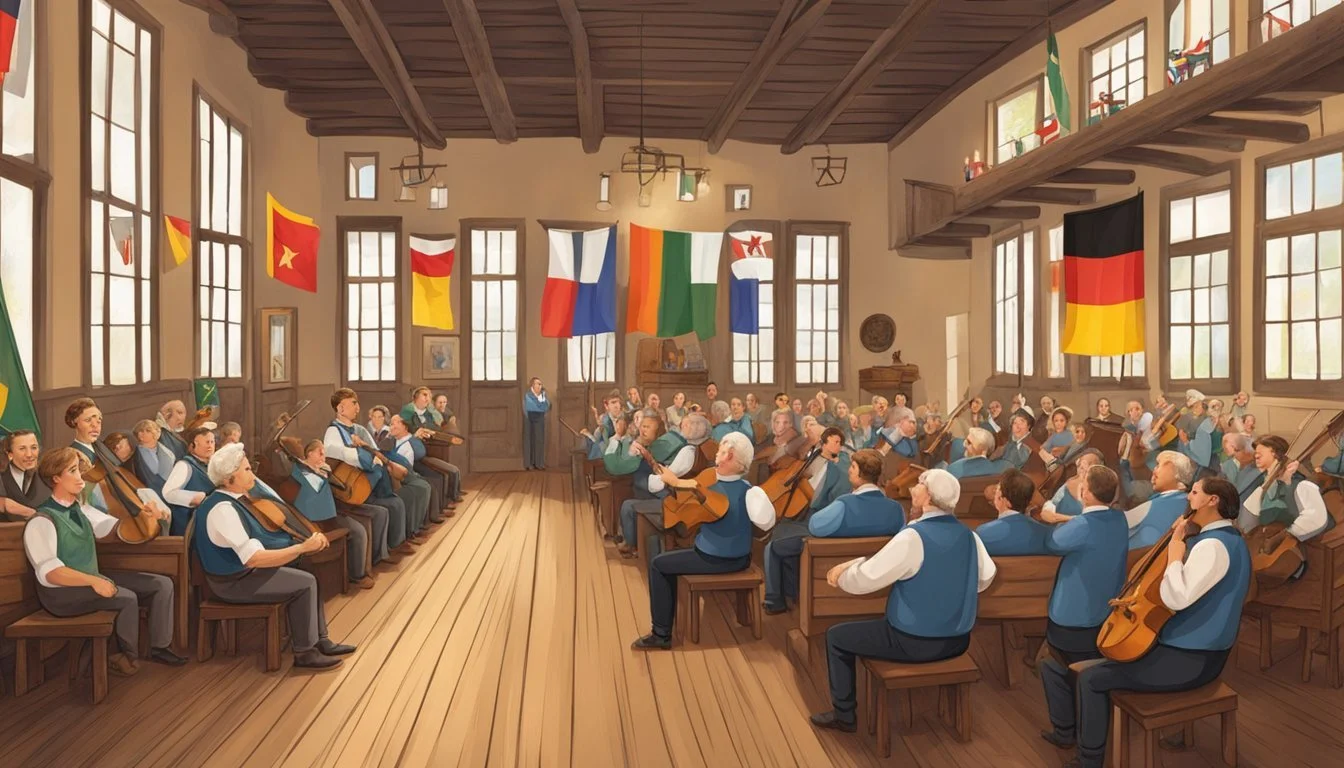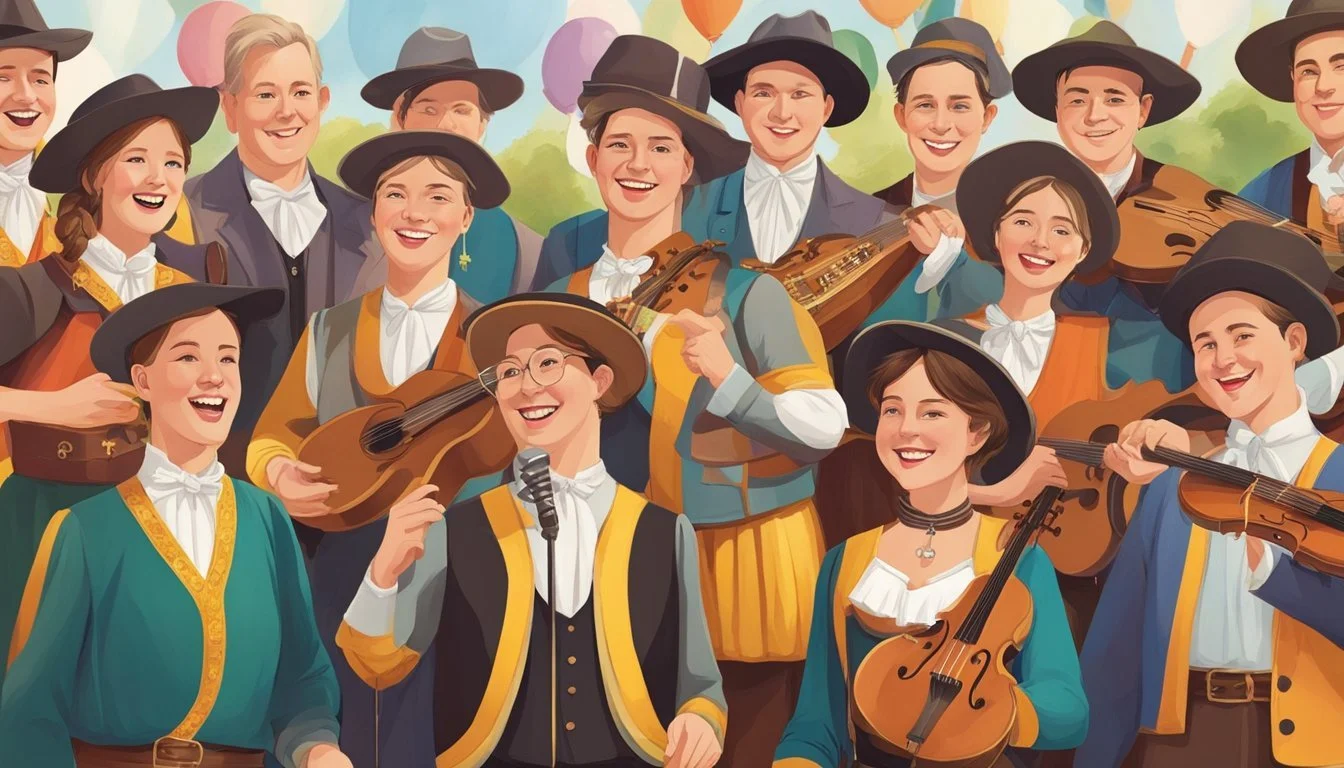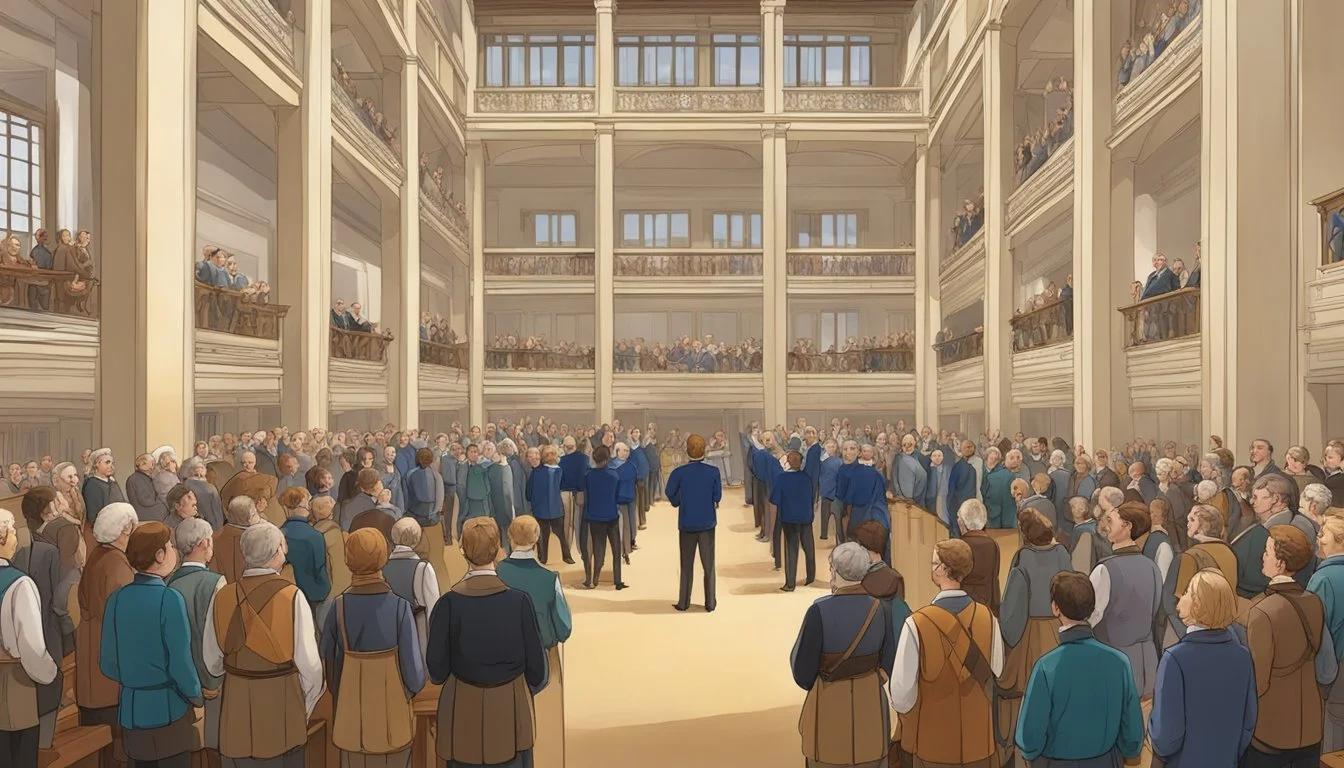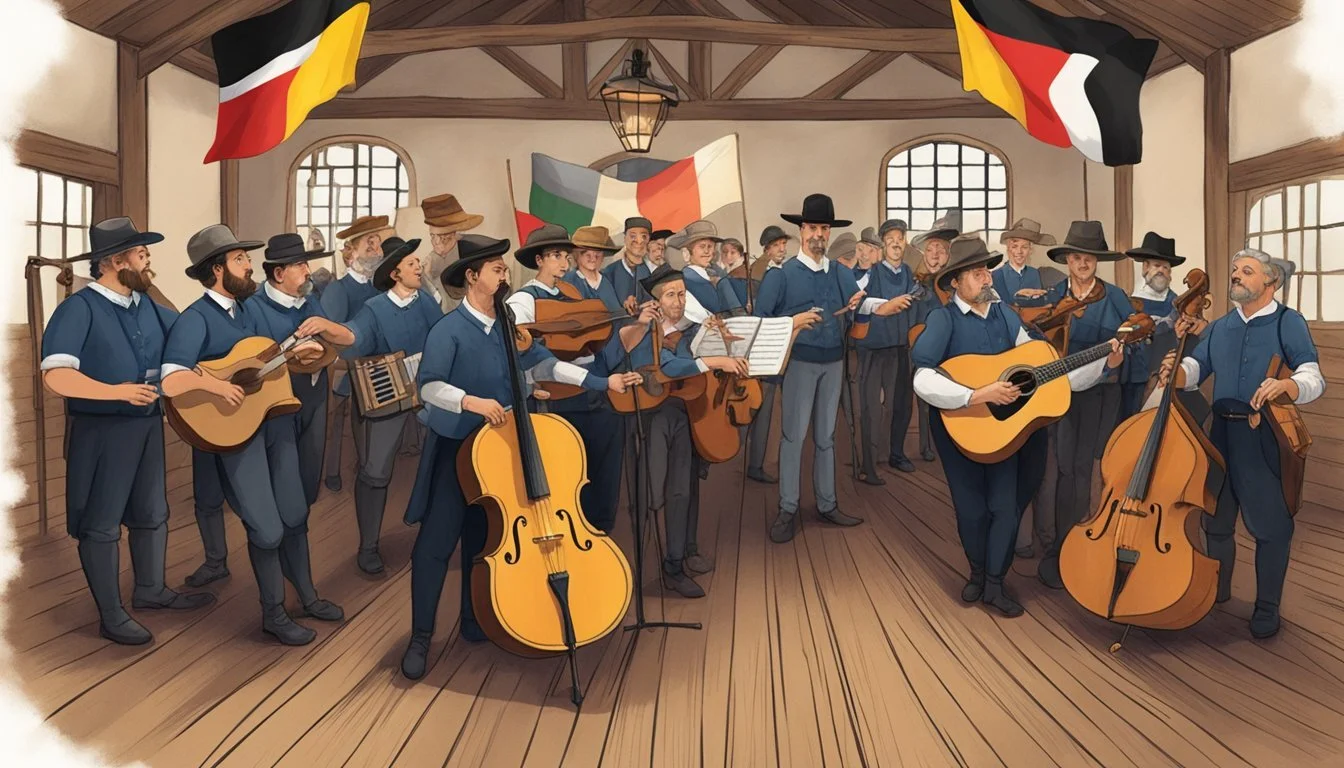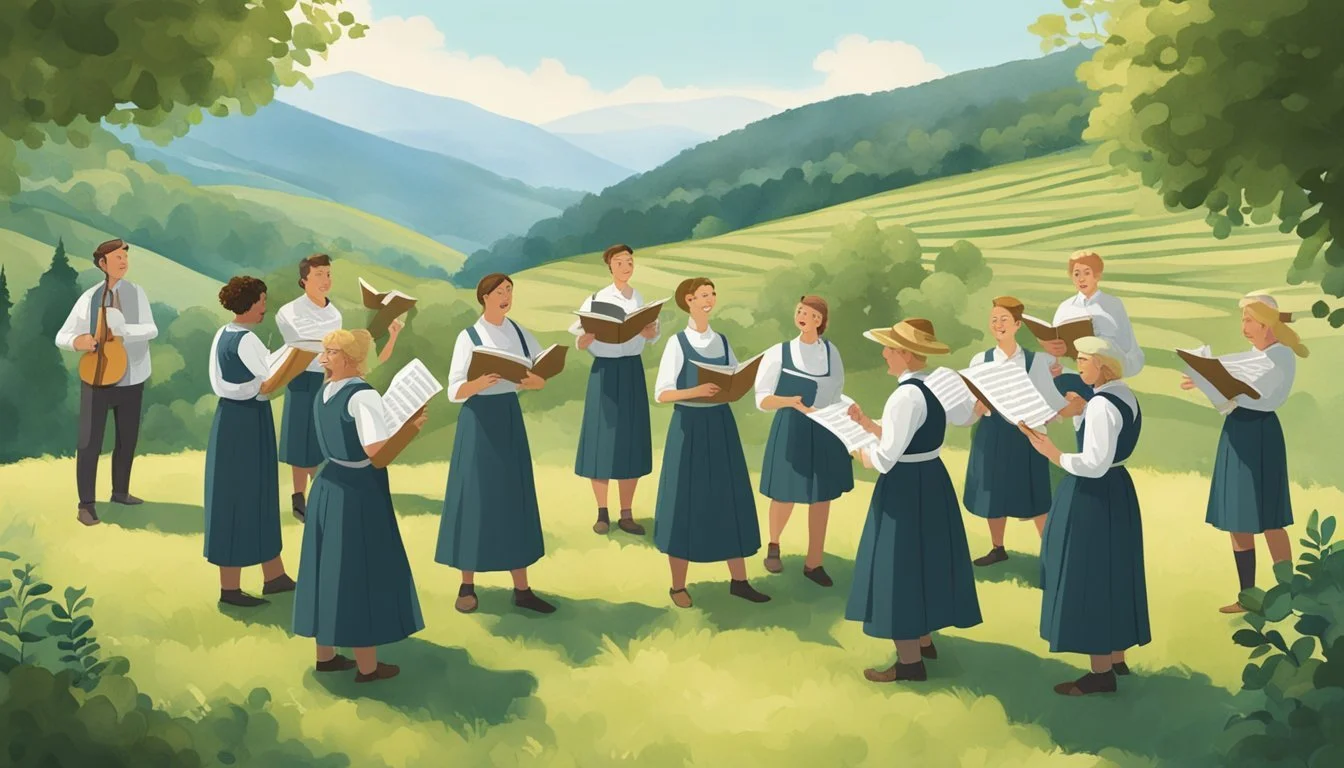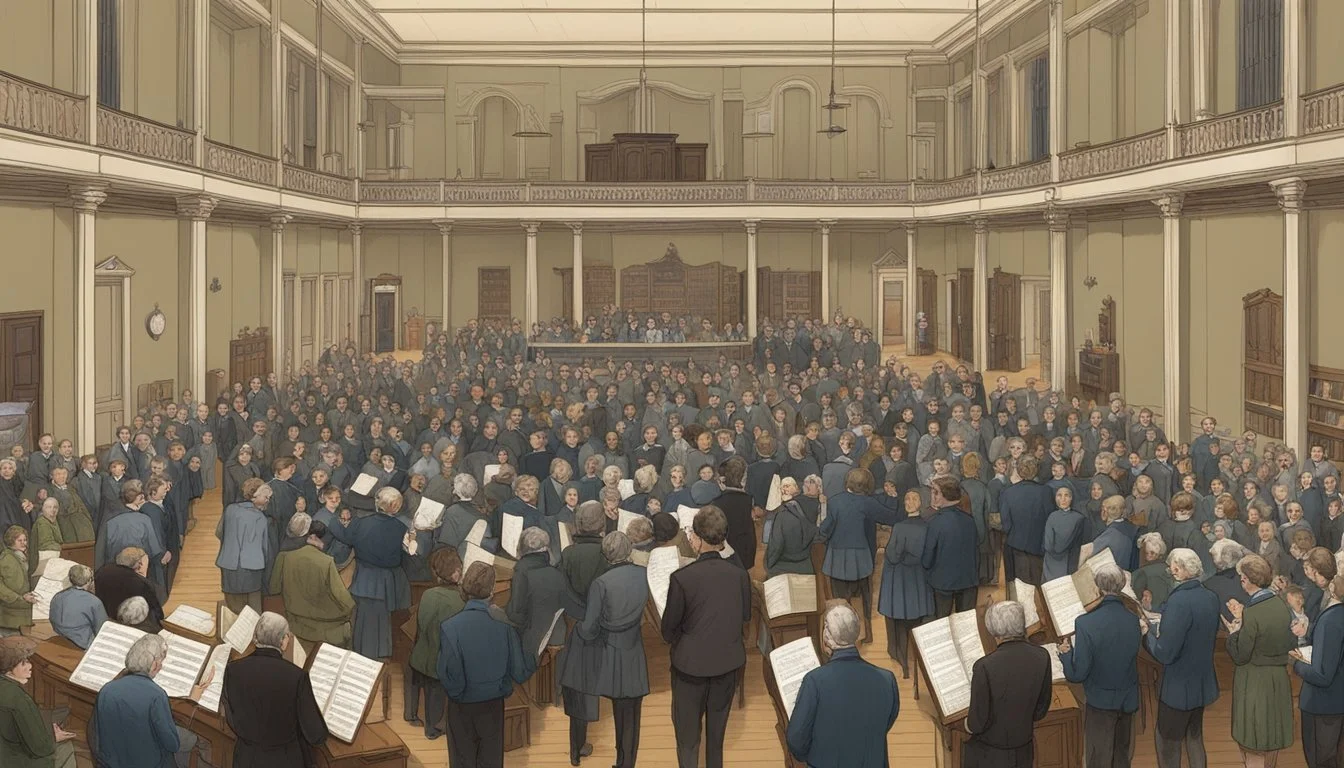The Story of the German Singing Societies in Texas
Cultural Harmony in the Lone Star State
The rich tapestry of Texan culture is interwoven with the legacy of German singing societies, a tradition that dates back to the mid-19th century. These societies, known colloquially as Sängerbunds, were not merely gatherings for choral enthusiasts; they served as crucial hubs for social interaction and cultural preservation within the German-Texan community. Reflecting their homeland’s love for music and fellowship, German immigrants established these societies shortly after their arrival in Texas, promoting German song, music, and language as a part of their new American identity.
By 1853, the New Braunfels Germania male singing society had already made its mark, leading to the formation of the Texas State Sängerbund—an association of similar groups across the region. This association highlighted the desire for communal celebration and the sharing of cultural traditions as they hosted their inaugural Saengerfest (singers' festival), an event that showcased individual performances and massed choirs, all singing a cappella. Such festivals grew in popularity, becoming a staple in the community's calendar.
Despite facing adversity during the World Wars, when anti-German sentiment reached its peak and public expressions of German heritage were met with suspicion, the singing societies endured. After World War II, a resurgence in cultural pride saw many of these societies, like the Houston Sängerbund, revitalizing their role in the community. They expanded to include a wider range of activities and social services, such as ladies auxiliaries and diverse recreational facilities, further cementing their place in the social fabric of Texas.
History of German Singing Societies
German singing societies, known as Gesangvereine, are steeped in a rich cultural heritage and have a storied history in the United States, particularly within Texas. Originating in the 19th century with significant German immigration, these societies served as communal hubs, preserving linguistic and cultural traditions through music.
Texas and German Immigration:
Mid-1800s: A surge in German immigration led to the establishment of German enclaves.
Cultural Preservation: Singing societies became vital for maintaining heritage.
Civil War and Society Formation:
Affected by the Civil War, the societies provided a sense of normalcy and unity.
They flourished post-war, fostering connections between German-Texans.
Twentieth Century Challenges:
World War I and II: Anti-German sentiment led to a decline in memberships.
Post-WWII: A resurgence occurred as societies revitalized their cultural activities.
Role in Communities:
Provided folk, religious, and classical music for various events.
Saengerfests: Festivals featuring choral competitions, enhancing cultural ties.
In conclusion, through adversity and changing times, German singing societies in Texas have played a pivotal role in sustaining the German-Texan identity, leaving an indelible mark on the state's cultural landscape.
Geographical Spread and Influence
German singing societies experienced a significant spread across Texas, establishing strong cultural footholds within central regions and major urban cities. These groups not only nurtured communal bonds among German Texans but also influenced the broader musical landscape of the state.
Central Texas and Hill Country
Within Central Texas and the Texas Hill Country, German singing societies flourished. Towns such as New Braunfels and Fredericksburg, bastions of German heritage, became central hubs for these cultural organizations. New Braunfels hosted the first Texas State Sängerbund in 1853, a singing festival that promoted choral music and unity among the German singing societies. These societies sang a range of music including folk, religious, and classical pieces, and were a staple at community events.
Major Cities in Texas
In major Texas cities, German singing groups also established a significant presence. San Antonio was home to the Männergesang-Verein as early as 1847 and later witnessed the formation of multiple other singing societies. Houston and Dallas also saw the rise of such groups, which contributed to their local musical and cultural scenes. German singing societies in these urban settings engaged with a larger audience, thereby extending their influence beyond their ethnic community.
Key Events and Festivals
German singing societies in Texas have a rich history marked by key cultural events and festivals. These gatherings, steeped in tradition, have served as both social and musical linchpins within the German-Texan community.
Saengerfest Tradition
Saengerfests have been central to the activities of German singing societies. Initially, these festivals featured all-male choral groups that performed a variety of music genres, from folk to classical. The first State Saengerfest can be traced back to 1853 when the New Braunfels Germania male singing society extended an invitation to other singing ensembles to participate in a collective celebration.
Year: 1853
Event: The first State Saengerfest
Location: New Braunfels, Texas
Participating Cities: Austin, San Antonio, Sisterdale
Local and State Events
Local communities each hosted their own events, often culminating in larger, more inclusive state Saengerfests. These larger events not only featured performances but also included business meetings where political discussions occasionally took place, connecting cultural celebration with civic engagement.
Annual Festivities: State Saengerfests and local singing society events.
Cultural Significance: A blend of music, fellowship, and politics.
While some of these traditions, such as the Saengerfest, have persisted over the years, other German cultural events like Oktoberfest have also been embraced by the broader Texan community, celebrating the state's rich German heritage through music and camaraderie.
Cultural and Musical Impact
The German singing societies of Texas had a significant effect on both the cultural fabric and musical landscape of the region. They served not only as custodians of German music and folklore but also as influential nodes that shaped the local culture through their traditions and performances.
German Music and Folklore
German singing societies in Texas were instrumental in preserving a wide array of German musical traditions, ranging from folk music to classical pieces. They held regular gatherings, where they performed a capella or accompanied by instruments, ensuring that German songs and compositions were not only preserved but also transmitted to subsequent generations. Folk music was particularly celebrated as it reflected the societies' cultural roots and was often showcased during family, church, and community events.
Influence on Local Culture
The imprint of these societies on local culture was profound. Classical music, for instance, once the purview of formal settings in Europe, found a warm reception in the Texan social milieu through the societies' frequent concerts and festivals. Cultural traditions such as the Saengerfest, a festival featuring singing competitions and social gatherings, became a staple of community entertainment, cementing the role of German music in Texas's diverse cultural tapestry. The presence of these societies helped to weave German song and culture into the very identity of many Texan communities.
Prominent Societies and Choruses
German singing societies have a rich historical tapestry in Texas, characterized by a slew of contributions to cultural and musical spheres.
Historical Societies
The Gesangverein Germania, founded in New Braunfels in 1850, was one of the earliest German singing societies in Texas.
Texas State Sängerbund
Established after a gathering in 1853, the Texas State Sängerbund became an umbrella organization for various singing societies including the Houston Sängerbund and the Austin Männerchor.
Saengerfests
Early societies would converge at Saengerfests, or singers' festivals, which featured performances by groups such as the Beethoven Männerchor.
Modern-Day Societies
Houston Sängerbund
Founded in 1883, the Houston Sängerbund remains active, with a commitment to preserving German song and culture.
Beethoven Männerchor
San Antonio's Beethoven Männerchor, established in 1867, continues to foster German music, hosting events and keeping the tradition alive.
Damenchor and Mixed Chorus
Many societies, including the Deutsch-Texanischer Sängerbund, now feature a Damenchor (women's choir) and mixed choruses, expanding their inclusivity and reach within the community.
German language remains intrinsic to performances, preserving linguistic heritage alongside musical traditions.
Key Personalities and Leaders
Foundational Figures
Johann Nicholaus Simon Menger: A prominent figure in San Antonio's early German cultural scene, he established one of the first singing societies, the Männergesang-Verein, in July 1847. His legacy lives on through his contributions to German music and culture in Texas.
Friedrich Hermann Seele: Seele was integral in the founding of the German singing society tradition in New Braunfels, Texas. His leadership helped to inspire the celebration of German song and camaraderie, which culminated in the inaugural state Saengerfest in 1853.
Influential Directors
Adolph Fuchs: As a conductor and teacher, Fuchs dedicated himself to the proliferation of German music and tradition. His impact was felt across multiple societies where his guidance led to the preservation of German song.
John M. Steinfeldt: The influence of Steinfeldt spanned across Texas through his involvement with German singing societies. His role helped solidify the cultural significance of these societies within the broader tapestry of Texas heritage.
Musical Pioneers
These leaders not only nurtured the musical traditions of their homeland but also provided social hubs that strengthened community bonds. Their commitment to maintaining German musical culture was instrumental in shaping the identity of Texas's German-American communities.
Name Role Contribution Simon Menger Founder Established Männergesang-Verein in San Antonio Friedrich Hermann Seele Founder Led to the first state Saengerfest Adolph Fuchs Conductor/Teacher Pedagogy and development of choral societies John M. Steinfeldt Leader Furthered the cultural reach of singing societies
German Singing Societies' Activities
The German singing societies of Texas were instrumental in preserving and fostering cultural heritage through various musical activities. They were known for their regular performances, hosting of social and cultural events, and contribution to educational efforts within the community.
Regular Performances
German singing societies regularly organized choral concerts that showcased a blend of folk, religious, and classical music. These performances were a cornerstone of the communal life in German Texan communities, occurring often at local Garten venues or churches. The societies upheld the tradition by featuring both small ensemble pieces and large orchestral-backed choral works.
Social and Cultural Events
Singing societies served as key focal points for social and cultural gatherings in the German Texan community. They hosted events such as the Saengerfests, which were popular singing festivals that brought together numerous singing groups for multi-day extravaganzas of music, competitions, and camaraderie. These festivals not only highlighted the societies' musical prowess but also fostered a sense of identity and unity among the German diaspora.
Educational Contributions
The societies’ activities extended to educational contributions, where they played a vital role in nurturing musical skills among community members. They provided a platform for learning German choral music and sometimes facilitated access to music education that included the participation of an orchestra, thereby enriching the community's cultural life. Through these efforts, they kept the German musical tradition alive and accessible for future generations.
Challenges and Resilience
German singing societies in Texas faced numerous adversities throughout their history, yet demonstrated remarkable resilience to sustain their cultural practices.
War and Anti-German Sentiment
During World War I and II, German singing societies encountered profound challenges. Anti-German sentiment swept through the United States, leading to a sharp decline in membership within these cultural organizations. Texans of German heritage experienced social ostracism, and expressions of German culture, including music, were often suppressed or discouraged. In some cases, individuals were even prohibited from speaking the German language in public.
Adaptation and Sustainability
Despite these difficulties, German singing societies displayed a commendable ability to adapt and persevere. Post-World War II, there was a resurgence of interest as these societies reinvigorated their role in the community, evolving into non-profit entities focused on preserving and celebrating their heritage through song. By adapting their repertoire and engaging with broader audiences, these societies sustained their traditions and ensured that the melodies of their ancestors continued to resonate throughout Texas.
Archival Records and Research
Archival collections form a valuable resource for understanding the rich history of German singing societies in Texas. Researchers frequently explore these collections for information on cultural, social, and historical contexts. One key figure in this domain is Dr. Theodore Albrecht, who contributed significantly through his dissertation titled "A History of the German Element in Texas from 1820-1850" and its extensive bibliography.
Institutional archives contain extensive documentation on these societies. The Sophienburg Museum and Archives provide access to records that speak of the challenges faced by German singing societies, especially during the World Wars. Additionally, UNT Libraries harbor a digital repository which preserves and makes accessible various academic works, potentially including those pertinent to the German singing societies of Texas.
Efforts have been made to increase accessibility through the adoption of machine-readable formats and the International Image Interoperability Framework (IIIF), which enables sophisticated digital interactions with scanned documents. Such advancements have streamlined the research process and widened availability for scholars and enthusiasts alike.
In particular, valuable resources may be available in PDF format, which remains the most popular digital document format for archival materials due to its wide compatibility and preservation of layout.
Regarding the specific materials used for research, it is possible that detailed accounts, records of events, and lists of members can be found within these archives, providing a comprehensive overview of the activities and impact of German singing societies in Texas.
Conclusion
The German singing societies in Texas, such as the Houston Sängerbund and the Beethoven Männerchor, represent a rich tapestry of cultural heritage. These societies, started by early German settlers, have not only preserved the art of choral music but also provided a social framework for community interaction.
Societal Impact:
Preservation of German song, music, and language
Functioned as social clubs with amenities like bowling alleys and bars
Cultural Significance:
Hosted Saengerfests (singers' festivals), fostering community and cultural exchange
The Beethoven Männerchor stands as a beacon of German heritage in San Antonio's Historic King William District
Despite facing hardships such as anti-German sentiment during the World Wars, wherein membership declined, these societies have continually adapted and revived.
Post-War Revival:
A revival of interest post-World War II
Introduction of auxiliaries and ladies' choirs to broaden involvement
Today, these organizations continue to celebrate German culture in Texas, affirming the enduring legacy of the state’s German ancestors. They remain central to the festive and communal traditions that have strengthened the bonds among their members and with the broader community.

